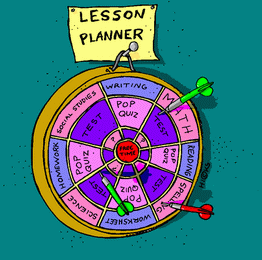 |
| http://teachers.redclay.k12.de.us/Judith.Conway/WriteEdObj.htm Write real objectives. Make your class meaningful! Don't just throw a dart and hope for the best while lesson planning! |
Unit objectives give classrooms and teachers a purpose. They act as a guideline for students and they show administrative individuals what the students will be learning and how it will be measured.
Objectives are very important because by just adding or taking away simple words, it completely changes the cognitive meaning of the objective. An example being, to list something vs explaining something that was just learned. It is much easier to list something rather than explain it since it mostly deals with memorization.
 |
| http://tech2040.pbworks.com/w/page/38193573/ABCD%20Objectives, DON'T WRITE OBJECTIVES THAT USE VAGUE VERBS. This link will bring you to a wonderful page where you can learn more about writing objectives. |
When writing unit objectives they have to go along with the different domains of learning: cognitive, psychomotor, and affective. Cognitive deals with facts, knowledge, information and concepts.This would be to relay information back to the teacher through lists, paraphrasing, and explaining. Psychomotor deals with including both mind and motor skills at the same time and has a lot of hands-on components. Affective is the hardest objective to write since it is the hardest to measure, as it deals with attitudes, values, aesthetics and appreciation (Newcomb).
In the chapter, Planning for Instruction, it suggests the following steps when writing objectives.
- Figure out the behavior that you want to be demonstrated/ measured
- The conditions under which the behavior is to occur
- The criteria by which the performance is judged (measured)
These steps make writing objectives more organized. They allow for creating the behavior but then actually figuring out a way to measure the behavior and control how/when the behavior is to occur.
It is vital for teachers to write objectives to keep the classroom flowing smoothly and for learning to occur. Learning will occur best in a low stress environment when the teacher and students are both aware of their duties and their means of accomplishing those duties.
 |
| http://fcit.usf.edu/assessment/basic/basicb.html, Base your objectives based on what behavior, conditions and criterion you want! |
I love your focus on action-oriented verbs!
ReplyDelete